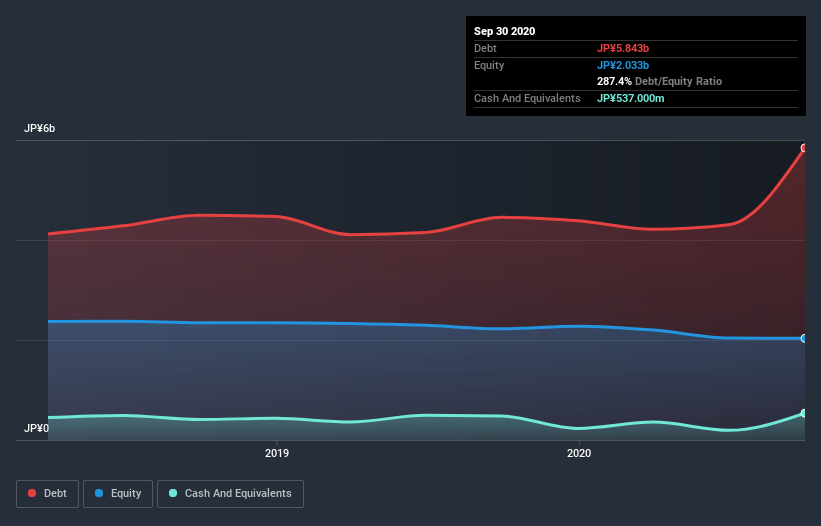OK Food Industry (TYO:2905) Has Debt But No Earnings; Should You Worry?

Warren Buffett famously said, 'Volatility is far from synonymous with risk.' So it seems the smart money knows that debt - which is usually involved in bankruptcies - is a very important factor, when you assess how risky a company is. As with many other companies OK Food Industry Co., Ltd. (TYO:2905) makes use of debt. But should shareholders be worried about its use of debt?
When Is Debt Dangerous?
Debt and other liabilities become risky for a business when it cannot easily fulfill those obligations, either with free cash flow or by raising capital at an attractive price. Ultimately, if the company can't fulfill its legal obligations to repay debt, shareholders could walk away with nothing. However, a more usual (but still expensive) situation is where a company must dilute shareholders at a cheap share price simply to get debt under control. Of course, the upside of debt is that it often represents cheap capital, especially when it replaces dilution in a company with the ability to reinvest at high rates of return. When we think about a company's use of debt, we first look at cash and debt together.
View our latest analysis for OK Food Industry
What Is OK Food Industry's Debt?
As you can see below, at the end of September 2020, OK Food Industry had JP¥5.71b of debt, up from JP¥4.45b a year ago. Click the image for more detail. However, it also had JP¥537.0m in cash, and so its net debt is JP¥5.18b.

How Healthy Is OK Food Industry's Balance Sheet?
The latest balance sheet data shows that OK Food Industry had liabilities of JP¥4.41b due within a year, and liabilities of JP¥3.37b falling due after that. Offsetting these obligations, it had cash of JP¥537.0m as well as receivables valued at JP¥1.24b due within 12 months. So its liabilities total JP¥6.01b more than the combination of its cash and short-term receivables.
This deficit casts a shadow over the JP¥3.96b company, like a colossus towering over mere mortals. So we'd watch its balance sheet closely, without a doubt. After all, OK Food Industry would likely require a major re-capitalisation if it had to pay its creditors today. When analysing debt levels, the balance sheet is the obvious place to start. But it is OK Food Industry's earnings that will influence how the balance sheet holds up in the future. So when considering debt, it's definitely worth looking at the earnings trend. Click here for an interactive snapshot.
In the last year OK Food Industry had a loss before interest and tax, and actually shrunk its revenue by 11%, to JP¥8.4b. That's not what we would hope to see.
Caveat Emptor
While OK Food Industry's falling revenue is about as heartwarming as a wet blanket, arguably its earnings before interest and tax (EBIT) loss is even less appealing. To be specific the EBIT loss came in at JP¥313m. Considering that alongside the liabilities mentioned above make us nervous about the company. It would need to improve its operations quickly for us to be interested in it. Not least because it had negative free cash flow of JP¥1.5b over the last twelve months. That means it's on the risky side of things. When analysing debt levels, the balance sheet is the obvious place to start. But ultimately, every company can contain risks that exist outside of the balance sheet. Take risks, for example - OK Food Industry has 3 warning signs (and 2 which shouldn't be ignored) we think you should know about.
Of course, if you're the type of investor who prefers buying stocks without the burden of debt, then don't hesitate to discover our exclusive list of net cash growth stocks, today.
If you’re looking to trade OK Food Industry, open an account with the lowest-cost* platform trusted by professionals, Interactive Brokers. Their clients from over 200 countries and territories trade stocks, options, futures, forex, bonds and funds worldwide from a single integrated account. Promoted
New: AI Stock Screener & Alerts
Our new AI Stock Screener scans the market every day to uncover opportunities.
• Dividend Powerhouses (3%+ Yield)
• Undervalued Small Caps with Insider Buying
• High growth Tech and AI Companies
Or build your own from over 50 metrics.
This article by Simply Wall St is general in nature. It does not constitute a recommendation to buy or sell any stock, and does not take account of your objectives, or your financial situation. We aim to bring you long-term focused analysis driven by fundamental data. Note that our analysis may not factor in the latest price-sensitive company announcements or qualitative material. Simply Wall St has no position in any stocks mentioned.
*Interactive Brokers Rated Lowest Cost Broker by StockBrokers.com Annual Online Review 2020
Have feedback on this article? Concerned about the content? Get in touch with us directly. Alternatively, email editorial-team@simplywallst.com.
About TSE:2905
OK Food Industry
OK Food Industry Co., Ltd. produces and sells fried tofu products in Japan.
Overvalued with weak fundamentals.


